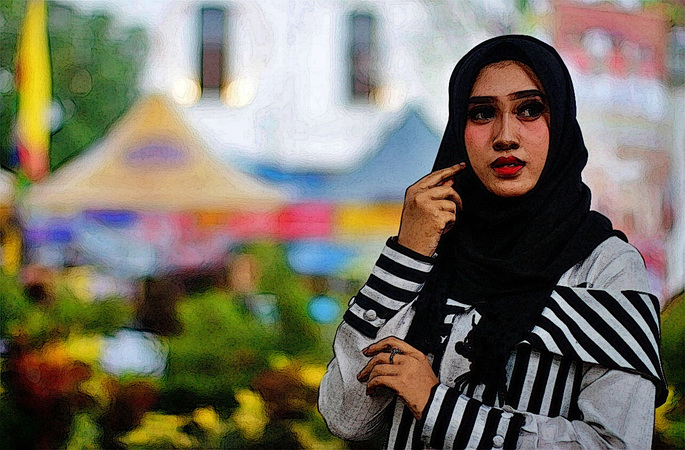Jammu & Kashmir Needs a Women’s Commission.
Waiting since morning inside Kashmir’s only women’s police station in Ram Bagh area of Srinagar for her abusive husband, 30-year-old Rukaya Jan and her three minor daughters were growing restless. Despite summons by the Station House Officer (SHO), her husband had not appeared before the police till noon. Although this was her third visit to the police station, her husband had not visited even once.
Rukaya was married to Imtiyaz – a resident of north Kashmir’s Bandipora district, in 2010. Over the years, she has been tortured and harassed. “My husband and his mother dragged me out of their house along with my three daughters,” recalled Rukaya. “Clueless, I pleaded with them to let me stay at least for the night, but they threw us out on a cold winter night,” she shared.
It wasn’t the first time that they had physically harassed her. “Not once in ten years I felt safe. When I was expecting our first daughter, I had hoped that Imtiyaz’s behavior would change. My hopes, however, were killed when he assaulted me while I was in the first trimester,” said Rukaya, who has spent most of the time in these 10 years in her mother’s house while her brother took care of their expenses.
Abolition of Women’s Commission Pushed Women to the Wall.
Tired of the violence of her in-laws, Rukaya had registered a complaint with the State Commission for Women (SCW) in 2018, stating that her husband had abandoned her and her daughters for more than a year now.
“The commission responded swiftly. They summoned him and directed him to not harass me or my daughters any further. They also asked him to provide for our sustenance. I was surprised as he behaved properly with us, but the happiness was short-lived. He started harassing me again after six months,” informed Rukaya.
But this time, Rukaya did not have the option to visit the commission as with the abrogation of Article 370 in August 2019, more than 150 laws, including the one that governed the functioning of the State Commission for Women and Child Rights, were repealed, and the commission was abolished.
More than 19 months have passed that the newly formed Union Territory of Jammu and Kashmir has been devoid of a proper institution to address the cases of violence against women. As a result, women like Rukaya have to now turn to the police stations for help.
Created in 1999, the SCW would investigate and examine matters relating to women’s protection and safeguarding of their rights. In 2018, the government formulated a Commission for Protection of Child Rights. It made it part of the Women’s Commission under the aegis of the Jammu and Kashmir State Commission for Protection of Women and Child Rights Act (JKSCPWCR).
Like Rukaya, thousands of women in J&K have been survivors of domestic violence and have been given the unavailability and inaccessibility to a proper redressal mechanism. As a result, they have been bearing the brunt of violence and neglect silently. According to National Crime Records Bureau (NCRB) 2019, the UT has witnessed as many as 3069 cases of crime against women, including rapes, molestation, and domestic violence, in 2019.
On the other hand, an official of the erstwhile commission on the condition of anonymity told me that in 2019 the commission had registered 5000 cases of domestic violence and matrimonial disputes. “ The Commission addressed the maximum number of cases through proper counseling and compensation to the victims. However, when article 370 was revoked and the commission was abolished, there were at least 300 unresolved cases. The cases were closed and handed over to the Social Welfare Department and we don’t know what happened afterwards,” the official said.
A Powerful Institution
Former Chairperson of the Commission, Vasundhara Pathak Masoodi, while talking about the importance of the commission in J&K, said, “JKSCPWCR was a masterpiece of legislation that conjointly provided for the protection of women and child rights. The Commission had significant powers including, but not limited to, investigation of matters relating to constitutional and legal safeguards for women and children, taking up cases of violations of their rights, to inspect homes, jails, hospitals and other places where women and children are lodged or kept or imprisoned.”
“The greatest potential for intervention, personally my favorite, was the power to look into complaints and ‘take suo-motu cognizance’ of violation of rights. The JKSCPWCR Act provided for all the powers of a civil court including that to summon a person from anywhere in J&K, to require production of documents, require evidence on affidavits, access to public records and the power of ‘issuing commissions for the examination of witnesses and documents’,” she added.
Comparing the powers of other state commissions for women, she said, “Well, all the women’s commissions in India have been established on the lines of National Commission for Women (NCW). But JKSCPWCR was an exceptional piece of legislation that provided for a conjoint mechanism to safeguard rights of women as well as children. Moreover, the multi-cultural, multi–lingual and multi-religious composition of J&K and its topography makes the task for JKSCPWCR very challenging as the biggest challenge is to make justice accessible to the last woman or child living on top of a hill.”
She believes that women and girls from socially and economically disadvantaged groups, rural or isolated areas are more vulnerable and at a greater risk of gender-based violence in J&K.
Jammu and Kashmir High Court Advocate Arshie Zuhar said that there were certain laws related to the erstwhile commission that made it more powerful than NCW.
“The erstwhile state commission had powers to establish sessions courts in each district which can provide speedy trials in offences against women and child rights. Also, it had powers to appoint a public prosecutor or advocate who has been in practice as an advocate for not less than seven years, as a special prosecutor for the purpose of conducting cases that go to court,” informed Arshie.
Only One Women Police Station
Women rights activist Ezabir Ali said that only a few women could muster the courage to go against their families and register a complaint in a police station. “Even if they decide to act, they are discouraged by the fact that to file a complaint they will be required to travel several kilometers to Srinagar that houses the only women police station in the entire valley. There is no platform at district level where women can feel comfortable to lament their sorrows,” Ezabir noted.
According to Ezabir, several women have been abandoned by their families, but they have no place to go. “In the absence of dedicated shelter homes for such women, they are forced to take shelter in shrines or in other abandoned locations. This makes them vulnerable to sexual exploitation,” she said.
Increase in Violence against Women during Covid-19 restrictions
Ezabir said that the lockdown due to Covid-19 had created ideal conditions for predators to indulge in domestic violence against women and children.
“The situation has been deteriorating for domestic violence victims as women found themselves locked at home with their abusers and are at increased risk of other forms of violence. The overloaded healthcare systems and disrupted justice services have added more to their struggle, thus resulting in more suicides and murder cases,” Ali added.
In response to whether domestic violence has increased since the nationwide lockdown, she said that there has definitely been an increase as newspapers report suicides or domestic violence cases in the UT daily.
On May 30th, after a girl’s death in Rajouri, Police had booked her in-laws for dowry death, while on May 31st, there was a report where the police and CRPF men had reportedly foiled a suicide bid by a woman at Badshah Bridge in Srinagar. Although it is not known what prompted her to take this extreme step, this can be blamed on the lack of a proper institution to address women’s concerns.
“Since lockdown was imposed in J&K, there has been a surge in the violence against women mostly in rural areas. It also points fingers towards the mental health needs of people which is being ignored for various reasons including social, familial stigma and taboos. People have lost jobs. Frustration and depression are common among people, and this has led to rise in violence at homes. Women are generally at the receiving end of all of this,” Ali noted.
NCW Functional but with Least Accessibility
Shehryar Khanum, co-founder and trustee of Mehram- an organization working for victims of gender-based violence- said, “The NCW has authority all over India while the erstwhile state commission was mandated to Jammu and Kashmir and people had direct access to the commission.”
However, she believes that since NCW has a tremendous caseload, J&K would not get the appropriate attention as they were getting with JKSCPWCR.
Online Portal not Accessible to Rural Women
Director, Integrated Child Protection Scheme and Women Empowerment, Shabnam Kamili, said that a team from NCW had visited the Valley in February. As a result, it was decided that women facing any violence can register complaints on their online portal until the commission sets up an office here.
“How can we expect women residing in remote areas with no access to internet, mobile or knowledge to register complaints and follow their cases online?
They are not even aware of what the NCW is,” Shehryar noted.
According to Shabnam, the commission will have its office in J&K once all the formalities are completed. Meanwhile, the Director-General of Women and Child Care will act as a liaison between NCW and the UT. If women are facing domestic violence or any other form of violence, they can even register their complaints either with me or the one-stop centre, or they can call 181,” Kamili said.
She said that although there are no shelter homes for destitute women in UT right now, the administration plans to set up such safe spaces soon.
This article was sourced from ‘Charkha Features’ Charkha works towards the social and economic inclusion of marginalized communities in remote and conflict areas through the creative use of media. Many of these areas are highly inaccessible and socially, economically and politically unstable.



